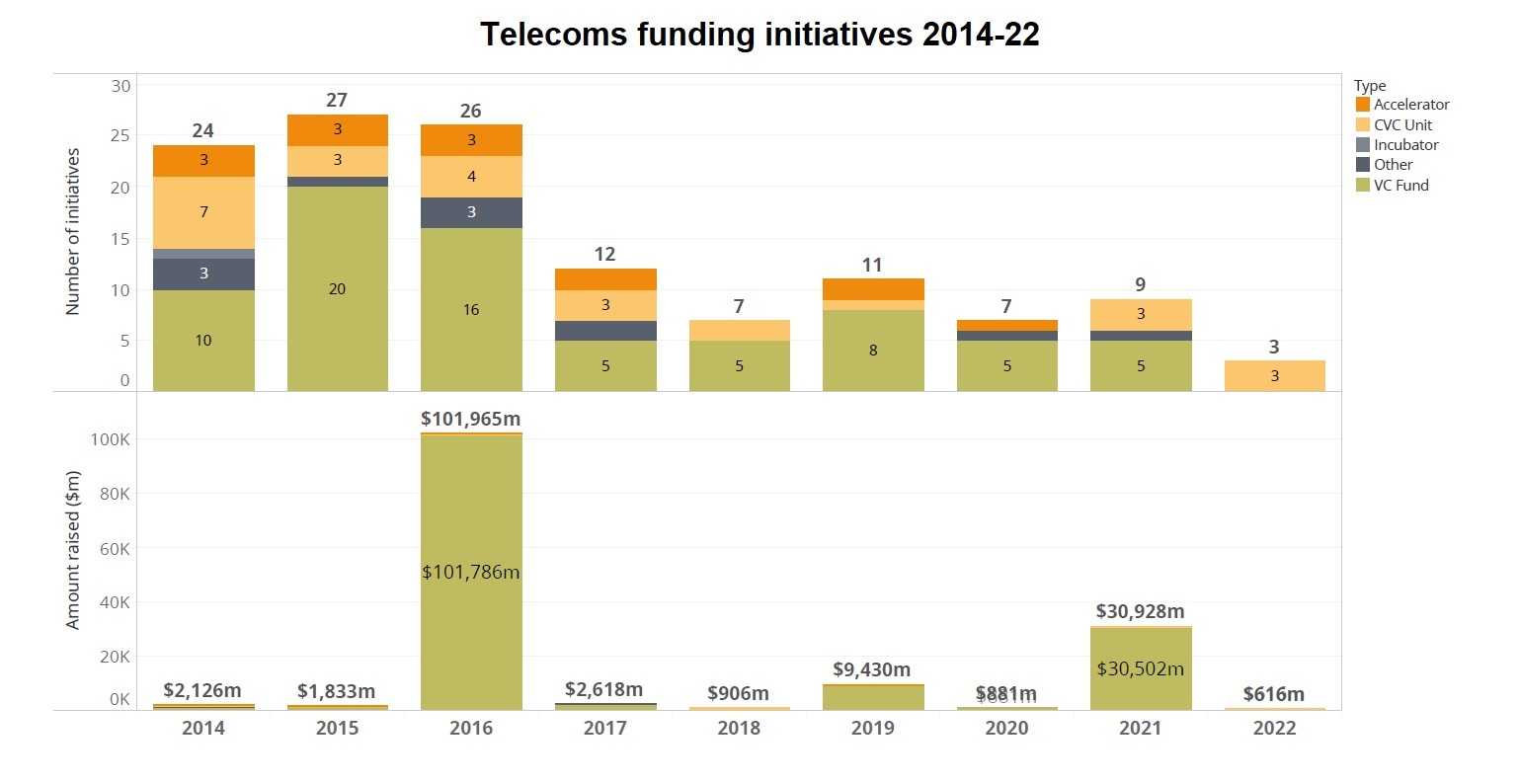The heyday of telecoms funds was 2014-2016, when incumbents in the sector launched a total of 77 investment arms in just three years. In 2016 more than $102bn in funding was raised collectively (though the figure includes SoftBank’s first multi-billion Vision Fund and is thus considerably skewed).
Things have been quieter since then, but 2021 saw a resurgence in spending, with total estimated capital at $30.93m. This was distorted by the size of the second Vision Fund, but there are signs that telecoms investment may be picking up, with a number of telecoms in emerging markets, like Serbia, Thailand and Kuwait, taking the plunge into corporate investment.

NTT Docomo Ventures (NDV), the corporate venturing unit of Japan-based NTT’s mobile phone operator, has raised Y15bn ($115m) for its third fund. Docomo Innovation Fund III’s limited partners are NTT Docomo and NTT Finance. NDV’s prior funds closed at Y10bn and Y15bn in 2013 and 2017, respectively. The third fund will continue to support Japanese and international startups and promote collaboration with Docomo companies.


Telekom Srbija, a Serbia-based phone operator, has set up a €25m ($30m) corporate venturing unit to invest in startups in multiple sectors. Last year, Telekom Srbija said it would set up its first corporate venture capital fund to invest over the next five years in startups in Serbia and Balkans region. Telekom Srbija said it would invest in artificial intelligence (AI), big data, financial tech, e-commerce, internet of things (IoT), media and telco, among other areas.

Norway-headquartered telecoms firm Telenor and Thailand-based conglomerate CP Group announced a plan to merge their telecommunications subsidiaries in Thailand and collaborate on a joint corporate venturing effort. The corporates would also look to raise between $100m and $200m of venture capital funding to invest in digital technology startups based in Thailand.

Kuwait-based telecoms firm Zain Group has set up a corporate venturing unit and struck its first deals. Zain Ventures will invest in digital innovations in electronic services. Its parent company had already committed to venture capital funds for firms such as Colle Capital Partners, Wamda, EarlyBird Venture Partners and Middle East Venture Partners. The unit’s first deals are Pipe the US-based developer of a digital trading platform for recurring revenues, and Swvl, a US-headquartered mobility service provider for mass transit in emerging markets. Swvl is set to go public through a merger with women-only led special purpose acquisition company Queen’s Gambit Growth Capital in collaboration with Agility and Luxor Capital Growth.
Military communication is one of the areas spurring spending.
Guangzhou Haige Communications Group, which provides communications and navigation equipment to the Chinese military, agreed to partner with China Poly Group and other entities to set up a RMB3bn ($471m) corporate venture capital fund. Haige Communications’ predecessor was a military ordnance factory, while Poly Technologies is a subsidiary of China Poly, the largest state-owned supplier of military equipment, missile technologies and drones to the Chinese military.
The planned fund is expected to serve as a platform for the Chinese military to enhance its technology competition with the US. Many of the US’s largest military suppliers, such as Lockheed Martin, Airbus and Raytheon, already have developed CVC and open innovation strategies, while NATO, the joint defence alliance covering western Europe and North America is preparing its $1bn venture fund strategy.
In the full telecoms report:
- 5G starts to pull telecoms sector out of investment doldrums (free to read)
- Web3 is a ‘game changer’ for telecoms says Telefónica Ventures (free to read)
- Singtel on the hunt for new 5G tech with extra $100m (free to read)
For subscribers: - What is strategic investing for a telecoms company in 2022?
- Investments in telecoms startups halved in value last year
- Telecoms incumbents part of $50bn worth of exits in 2021
- A resurgence in telecoms funds?
- Fundraising by university telecoms spinouts picks up
- SoftBank creates ripple of job moves in telecoms sector